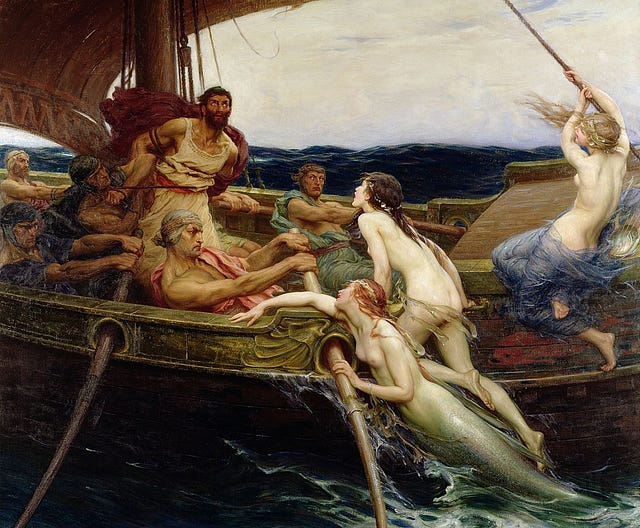
I want to disable my access to my (Medium) stats.
In Greek mythology, Sirens are creatures that seduce sailors with their irresistible voices, drawing them to their deaths. In Homer’s Odyssey, the hero Odysseus, passing through, instructs his sailors to plug their ears with beeswax and to tie him to the mast, leaving him there, no matter how much he would beg to be untied. But when he hears their voices, the song enchants Odysseus’ heart. He demands to be freed. He longs to plunge into the waves and to swim to the island, what would be his death. As agreed, his men ignore him, and don’t stop rowing until they had passed out of earshot. They survive.
Like Odysseus, I would have myself tied to the mast of my ship — my laptop? — to restrict myself from doing something I don’t want to do. I aim to self-hack myself out of checking my page views.
These numbers are addictive.
“3500 views today? I AM SO AWESOME!! Ben Hardy move the fuck over!! Whyam I still not featured?”
More recently:
“Only 1000 views so far? Of course you’re not featured, you totally suck. Don’t pretend you have anything to say, just write something that is safe and people actually click on.”
Do they read me? What about now? And now?
As you can see, this behavior is toxic. It flows from neediness and feeds insecurity — a self-fulfilling prophecy.
It requires a fat stack of self-confidence to remain convinced of the quality of your creative work if your audience doesn’t buy what you make. A stats page is a popularity meter that reminds us of this financial and psychological dependence. That activates our defense mechanisms — “just play it safe and please the audience.”
When the online Sirens catch us, we survive, but the creative genius inside us dies.
So I have good news: you can ignore your stats, because there is a better way to evaluate your work.
Why stats are useless
First of all, numbers aren’t that informative to begin with.
For one, popularity doesn’t mean quality. In fact, for ideas, there is a trade-off between depth and clicks. Was it a good piece? God knows, and pageviews aren’t God.
Moreover, there’s a big portion of luck involved in whether an article goes (semi-)viral or not. Don’t attribute to skill what ought to be attributed to fortune.
Sure — how many views an article get says something. But it mainly says something about its title. And, of course, analyses of parameters have their purposes. I have a piece with the magnificent read ratio of 5%. That’s a lesson.
Nevertheless, it’s an error to infer that a story that has scored higher, is better.In the world of online content, it is tempting, but ultimately defeating, to conflate the two. Information about popularity simply doesn’t provide that kind of knowledge.
Creation is about self-expression
Of course, as a professional, you want to have some way of judging what you’ve made. But, for better or worse, when your products are creative ones, the best assessment criterion isn’t a strictly a metric.
Numbers don’t determine whether a product was high-quality. What does? There is no magic formula for creating good content. In writing, indicators of value will differ per author. That said, I would like to propose one guiding principle that you can use in deciding on your criteria for evaluating your work:
To what extent was this article the result of optimal self-expression?
When I evaluate what I wrote, apart from writing-technical issues, I question why I wrote what I did and whether it was a real me piece.
Does this sound too easy? Let me hasten to add that self-expression doesn’t mean pouring out every concern, worry, fault, mistake and okay it with the label of vulnerability. It’s not a quantitative thing. Neither can increase in quality of self-expression make up for poor writing. In sum, self-expression is a necessary condition for long-term creative success, but not a sufficient one.
Closing lessons from Seneca
What makes good art, is the artist expressing the core of her being through the art. Popularity metrics, however, optimize for conformity, not for uniqueness. Therefore:
If you’re in a creative line of work, then numbers about popularity are your enemy — not your compass.
Yet, they are incredibly seductive. I need someone to tie me to the mast of my ship. If platforms like Medium had a feature that disabled access to stats-pages, I’d be willing to pay for it.
I am reminded of Seneca, who, in the seventh of his Letters to Lucilius, writes:
“The following also was nobly spoken by someone or other, for it is doubtful who the author was; they asked him what was the [purpose] of … art. He replied: “I am content with few, content with one, content with none at all.”
The point, as Tom Kuegler has similarly argued on here, is that “there’s much more value in the one.” Seneca explains what this means for us creatives:
“Lay these words to heart, Lucilius, that you may scorn the pleasure which comes from the applause of the majority … Have you any reason for being pleased with yourself, if you are a person whom the many can understand? Your good qualities should face inwards.”
The only way to be successful is to not care about being successful. When you’re true to yourself, all these things will follow.
Like to read?
Join my Thinking Together newsletter for a free weekly dose of similarly high-quality mind-expanding ideas.